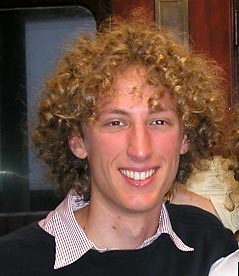UC Berkeley Web Feature
Students, diplomacy and the Middle East: Far closer to graduation than to peace
Zachary Hendlin, a junior majoring in economics and philosophy, is managing editor of the non-partisan Berkeley Political Review. Hendlin filed this report for the NewsCenter from the recent World Affairs Council Conference on the Middle East.
PACIFIC GROVE, CA. - Arrive in the dining commons even a few moments late, and discussions are already in full swing about the Israeli-Palestinian conflict, Iraqi democracy, and even the relevance of the European Union. Such is the heady atmosphere of the World Affairs Council Conference on the Middle East, a weekend of lectures, panels and simulations that aims to provoke thought, discussion, and perhaps even a little movement toward peace and understanding.
 Zachary Hendlin |
The recent three-day session at the Asilomar conference center in Pacific Grove covered topics ranging from proliferation and religion to economic development and the justifications for preemptive action. Speakers included Michael Nacht, dean of UC Berkeley's Goldman School of Public Policy, Berkeley professors Dariush Zahedi and Mark Danner, New York Times writer Judith Miller and Harvard professor Rev. Bryan Hehir.
Diplomats and academics alike debated whether Middle East peace will ever come to fruition. Ethnic and religious tensions make reform exceedingly difficult, and even if democracy swept the region, there remains a real possibility that future democratic governments would be hostile to the United States and other nations.
In the discussions about the Arab world, there was surprisingly little optimism, despite the recent advance of democracy in Iraq and Saudi Arabia (local elections), the Syrian withdrawal from Lebanon, and the recent decrease in Israeli-Palestinian tensions. With so many obstacles lining the road ahead - including the potential for nuclear proliferation in Iran and North Korea - even the optimists seemed guarded about the possibilities for peace, in the Middle East and the world at large.
It wasn't all talking heads. High school, college and graduate students in fields from engineering to economics (with a disproportionate number of political science majors) took part in simulations that grappled with the weighty issues of world affairs. In some ways, the simulations echoed real life: The North Korean delegation remained unwilling to yield to outside pressures. The Japanese delegation raised the threat of remilitarization in response to North Korean proliferation.
The simulations - complete with closed-door negotiations, treaties and informal agreements - gave me a sense of how frustrating diplomacy can be. As a member of Japanese delegation, I thought it a bold step to threaten remilitarization. But the experts participating in a panel discussion later that evening made the possibility of remilitarization or proliferation seem far less remote.
Things I usually take as given, such as the dangers of Iran or North Korea developing nuclear weapons, did not seem quite as clear-cut when simulation negotiators for those nations voiced their concerns about Washington's invasion threats, and made clear their desire to "protect" against U.S. power. To underscore the point, they noted that Iran and North Korea - both "axis of evil" countries - have not been attacked, while Iraq, with no nuclear weapons programs, was invaded by U.S. forces.
For myself and the seven other Berkeley students in attendance, the thoughts and experiences of World Affairs Council members gave us plenty to learn from, and to challenge. But even for these veteran global thinkers, ideas were far more common than solutions or distinct policy actions, especially when dealing with thorny issues like whether it is justified to attack nations that are developing nuclear weapons.
Even predictions of where the world is headed seemed problematic. Business strategist and writer Peter Schwartz noted that six months ago, we would not have been able to predict the success of Iraqi elections or the easing of Israeli-Palestinian tensions.
Extremist religious factions of all stripes - from suicide bombers and abortion clinic bombers to unyielding settlers in the West Bank - were repeatedly cited as a threat to the peace process. "Every religion has its extremists," said Harvard's Hehir.
If poverty and desperation are the foundation for extremism, as many speakers argued, then there are things that can be done. Supporting reputable humanitarian non-governmental organizations, offering incentives for eliminating corruption, and applying political pressure on authoritarian regimes are tangible steps that the U.S. government could take to improve the situation in the Middle East.
Companies have a role in this process, too. Right now, most countries in the region hire foreign multinationals to undertake large projects, but those companies rarely hire local workers and leave little knowledge or profit behind when the project is finished. The region would be better served if those foreign companies were hired to consult on large projects, rather than to take them on single-handedly.
There are things to be done for the betterment of the Middle East and the world, as the Asilomar conference showed. In many cases, they are indistinct, uncertain, and difficult to undertake. But they are too important to turn away from.

